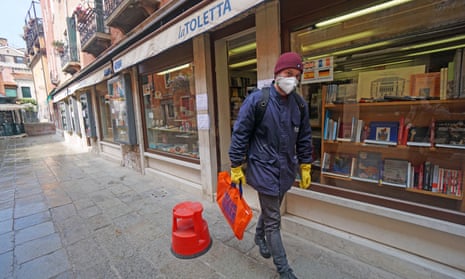When the Italian government declared that books were “essential goods”, paving the way for bookshops to be among the first businesses to emerge from the coronavirus lockdown on Tuesday, there was no rush to pull up the shutters, as might have been expected from an industry that has been battling for survival for years.
“I will be very happy to reopen as soon as we can do so safely,” said Nicoletta Maldini, a partner in Libreria Trame, a bookshop in the heart of Bologna. “At some point we will need to restart, but until then we need to move with caution and respect.”
Maldini did not stay closed alone. She was among the 247 bookshop owners across Italy who signed a petition gathered by LED, an online platform for booksellers and publishers, against being permitted to reopen their stores.
Their hesitancy to emerge from the lockdown could reverberate in other countries badly hit by coronavirus as governments edge towards easing restrictions. The death toll in Italy reached 21,067 on Tuesday and the infection rate, though growing by less and less each day, is yet to show a definitive sign that the contagion is overcome.
In an open letter to the prime minister, Giuseppe Conte, the group wrote: “As booksellers, we are happy with this sudden attention on our work … but we have no intention of exposing ourselves for the sole purpose of faking a ‘cultural recovery of souls’, which you can only really have when everyone’s safety is assured.”
The government decree also permitted stationers and shops selling children’s clothes to reopen, for forestry activities to resume and for computer manufacturers to restart production.
Regions have the power to relax restrictions at their own pace, and two of the worst-affected, Lombardy and Piedmont, opposed the decree and maintained their lockdowns as before. Authorities in Campania, in the south, and the island of Sardinia, are also maintaining full restrictions, while Lazio, the region surrounding Rome, has postponed the reopening of bookshops and children’s clothes shops until 20 April.
The same businesses can reopen in Tuscany and Umbria, as long as staff wear masks and gloves, and in Veneto, but only for two days a week.
On top of having little time to prepare safety measures, such as disinfecting premises, shop-owners say reopening would be costly if few customers come. It is also unclear if the businesses will lose the financial assistance they’re entitled to during the lockdown if they reopen.
“If you’re telling people to stay at home, who do we open to?” said Rimedia Deffenu, the owner of Libreria Ghibellina, a bookshop in Pisa, Tuscany. “Deaths are still too high, it’s too early to reopen.”
Gianluca Arcimboldo Fioravanti, who owns Libreria Arcimboldo, a bookshop in Orvieto, Umbria, said: “The institutional message is to ‘stay at home’, so how can people go out with peace of mind and take a tour of a bookshop? What if they don’t find the book they want, do they go around other bookstores? Then there are the costs – without any takings, it is better to remain closed.”
Maldini and Deffenu are currently delivering books to homes, and many others are planning to follow suit from this weekend.
Feltrinelli, Italy’s largest bookshop chain, said it was preparing safety measures before gradually reopening some stores from 18 April in the regions permitted, and that there would be a maximum of three staff in each. Giunti and Mondadori, two other major chains, have adopted a similar plan. The only bookstore chain to reopen on Tuesday was Libraccio, which opened 19 out of 49 stores.
A taskforce led by the former CEO of Vodafone, Vittorio Colao, has been created to navigate Italy’s exit from quarantine as part of the so-called “phase two”, which could begin after the current lockdown period ends on 3 May. The team of 17 will be responsible for devising a plan for a gradual return to normality and includes Enrico Giovannini, a former labour minister and professor at Rome’s Tor Vergata university, as well as other economists, business managers, lawyers, sociologists and psychologists.
In the meantime, some regions have taken other tentative steps. In Trento, shops will stay closed but construction sites can reopen if safety measures are in place. The Liguria region has allowed allotments to reopen and beach maintenance to resume while citizens in Alto Adige can visit relatives, but only by foot.
